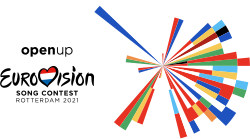
Back مسابقة الأغنية الأوروبية 2021 Arabic Festival d'Eurovisión 2021 AST 2021 Avroviziya Mahnı Müsabiqəsi Azerbaijani Конкурс песні Еўрабачанне 2021 Byelorussian Конкурс песьні Эўрабачаньне-2021 BE-X-OLD Евровизия 2021 Bulgarian Eurosong 2021. BS Festival de la Cançó d'Eurovisió 2021 Catalan Еврогайтам-2021 CE Eurovision Song Contest 2021 Czech
| Eurovision Song Contest 2021 | |
|---|---|
| Open Up | |
 | |
| Dates | |
| Semi-final 1 | 18 May 2021 |
| Semi-final 2 | 20 May 2021 |
| Final | 22 May 2021 |
| Host | |
| Venue | Rotterdam Ahoy Rotterdam, Netherlands |
| Presenter(s) | |
| Directed by |
|
| Executive supervisor | Martin Österdahl |
| Executive producer |
|
| Host broadcaster | |
| Website | eurovision |
| Participants | |
| Number of entries | 39 |
| Number of finalists | 26 |
| Debuting countries | None |
| Returning countries | |
| Non-returning countries | |
| Vote | |
| Voting system | Each country awards two sets of 12, 10, 8–1 points to ten songs. |
| Winning song | "Zitti e buoni" |
The Eurovision Song Contest 2021 was the 65th edition of the Eurovision Song Contest. It took place in Rotterdam, Netherlands, following the country's win at the 2019 contest with the song "Arcade" by Duncan Laurence. The Netherlands was set to host the 2020 contest, before it was cancelled due to the COVID-19 pandemic. Organised by the European Broadcasting Union (EBU) and host broadcasters Nederlandse Publieke Omroep (NPO), Nederlandse Omroep Stichting (NOS) and AVROTROS, the contest was held at Rotterdam Ahoy, and consisted of two semi-finals on 18 and 20 May, and a final on 22 May 2021. The three live shows were presented by Dutch television presenters and singers Chantal Janzen, Edsilia Rombley and Jan Smit, and Dutch YouTuber and make-up artist Nikkie de Jager.
Thirty-nine countries participated in the contest, of which twenty-six re-entered the artists chosen for 2020 (albeit with different songs, as per the contest's rules). Compared to the 2019 edition, Bulgaria and Ukraine returned while Hungary and Montenegro did not. Armenia and Belarus had originally planned to participate, but Armenia withdrew due to its social and political crises following the Second Nagorno-Karabakh War, and Belarus was disqualified after submitting entries in violation of the rules twice, and not providing an eligible entry before the deadline.
The winner was Italy with the song "Zitti e buoni", performed by Måneskin and written by the band's members Damiano David, Ethan Torchio, Thomas Raggi, and Victoria De Angelis. France, Switzerland, Iceland and Ukraine rounded out the top five, with France and Switzerland achieving their best results since 1991 and 1993, respectively. Italy won the combined vote and televote, but placed fourth in the jury vote after Switzerland, France, and Malta. Italy was the second member of the "Big Five" since its introduction to win the contest after Germany in 2010. For the first time since 1995, none of the top three entries were performed in English, with France and Switzerland performing in French, and Italy in Italian.
Also, for the first time since the current voting system was implemented in 2016, more than one country received no points from the televote in the final; these countries were Germany, Spain, the host country the Netherlands, and the United Kingdom, the last of those becoming the first country to receive no points from both the jury and televote. It was the second time that the United Kingdom had received no points in the contest, the last time having been in 2003. For the first time since its debut in 2015, Australia failed to qualify for the final, making Ukraine the only country that has never failed to qualify from the semi-finals since their introduction in 2004.[a]
The EBU reported that the contest had an audience of 183 million viewers in 36 European markets, an increase of a million viewers from the previous edition, with an increase of seven percent in the 15–24 year old age range.[1][2]
Cite error: There are <ref group=lower-alpha> tags or {{efn}} templates on this page, but the references will not show without a {{reflist|group=lower-alpha}} template or {{notelist}} template (see the help page).
- ^ "183 million viewers welcome back the Eurovision Song Contest". European Broadcasting Union (EBU). 31 May 2021. Archived from the original on 2 June 2021. Retrieved 31 May 2021.
- ^ "182 million tune in to 64th Eurovision Song Contest as young audience numbers surge". European Broadcasting Union. 28 May 2019. Archived from the original on 28 May 2019. Retrieved 28 May 2019.
© MMXXIII Rich X Search. We shall prevail. All rights reserved. Rich X Search
